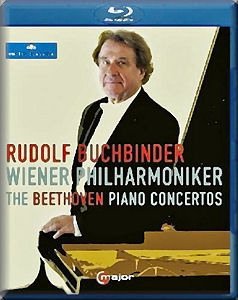 |
 |
|


alternatively
MDT
AmazonUK
AmazonUS |
Ludwig van BEETHOVEN
(1770-1827)
Complete Piano Concertos
Piano Concerto No.1 in C, Op.15 [37:01 + 2:09 applause]
Piano Concerto No.2 in B. Op.19 [28:40 + 2:09 applause]
Piano Concerto No.3 in c minor, Op.37 [35:12 + 1:58 applause]
Piano Concerto No.4 in G, Op.58 [34:11 + 1:34 applause]
Piano Concerto No.5 in G flat, Op.73 (Emperor) [37:03 + 2:03
applause]
Bonus - Documentary about Rudolf Buchbinder plus interview with
Joachim Kaiser [28:13]
 Rudolf Buchbinder (piano and conductor); Wiener Philharmoniker
Rudolf Buchbinder (piano and conductor); Wiener Philharmoniker
rec. Goldener Saal, Musikverein, Vienna, 5-8 May 2011. DDD/DSD
Picture format 16:9. High definition (1080i)
PCM stereo, DTS-HD MA 5.0
Region code A-B-C
Booklet in English, German and French
Bonus subtitles in English, German, French, Spanish, Korean, Chinese
and Italian
Also available on DVD 708808.
 UNITEL CLASSICA/C MAJOR 708904
UNITEL CLASSICA/C MAJOR 708904  [186:00 + 29:00 bonus: Buchbinder’s Beethoven, a musical conversation]
[186:00 + 29:00 bonus: Buchbinder’s Beethoven, a musical conversation]
|
|
|
Video of this performance of Concerto No.1 available on YouTube
here.
In the late 1960s Leonard Bernstein caused a stir in London’s
Royal Albert Hall when he played Ravel’s G major Piano
Concerto whilst at the same time conducting the New York Philharmonic
Orchestra. We were not used to this sort of thing at the time.
So that Bernstein could have maximum contact with his players,
he turned the piano such that he was in amongst them, facing
the orchestra with his back to the audience. He also removed
the piano lid; in these ways his gestures could be seen clearly
by the orchestral players and he could also maintain eye contact,
an essential part of the conductor’s art. I remember a
pretty stunning and immaculate performance on that occasion,
but since then, most soloists have preferred to concentrate
on their own music and leave the orchestra under the direction
of someone else.
Buchbinder is one of the exceptions, preferring to direct the
orchestra himself from the keyboard. He retains the normal soloist’s
position with his profile to the audience and he has the piano
lid raised. Considering this, the ensemble is remarkably good
and mostly very tight, but there are times when there are imprecisions
in togetherness, not only in rhythm but also in homogeneity
of tone and colour. Sometimes I can hear less string sound at
the start of a note, for example. So although there are great
advantages in having one musician ‘in charge’ of
a performance, I am largely in favour of using the services
of a conductor as well as a soloist, especially in recorded
music when a performance will be heard repeatedly and imprecise
ensemble can become irritating.
That said, these performances are deeply felt and as the talk
on the disc confirms, very thoroughly researched by Buchbinder
who compares many different editions of the works he is performing.
I particularly liked the finales where there is real rhythmic
vitality, combined in the third and fifth concertos with excitement
and drama. The first concerto finale has wonderful wit and humour,
but the opening of the fourth concerto finale is marred by poor
ensemble caused by lack of a conductor. A really clear gesture
must be given here to ensure precision and clarity.
Some movements are a little slow and heavy by modern standards.
For example in the first movement of Concerto No.1, Stephen
Kovacevich and Colin Davis on CD give a much lighter and more
deft performance. Buchbinder chooses to play the first of Beethoven’s
three cadenzas, slightly adapted towards the end, and he plays
it superbly. Most players, including Kovacevich, play the longer
and more dramatic third cadenza, whilst Argerich plays the second.
It would be interesting to know why Buchbinder chose the first
cadenza. The enclosed booklet talks about Buchbinder’s
career and gives us some information about his study of the
many editions that have appeared since Beethoven’s time,
but more details of the results of his studies would have been
welcome. However, the bonus interview on the disc with Joachim
Kaiser is very interesting and stimulating.
The first movement of Concerto No.3 is hardly allegro con
brio and the first movement of Concerto No.4, marked to
be played allegro moderato is much moremoderato
than allegro. A little more rhythmic life would not come
amiss in these movements. In Concerto No.4 Buchbinder gradually
moves the pace forwards as the music progresses, but for me
this is one of the less successful movements. Although the sound
is often beautiful, the performance is sometimes sluggish and
there are tiny imperfections in ensemble and intonation. In
the second movement, Buchbinder’s orchestra plays the
opening theme really staccato, as marked in the two editions
of Beethoven’s score that I own, to telling effect.
The high point of these performances for me is the Emperor,
which I enjoyed immensely. It really takes fire, has great rhythmic
energy and verve in the outer movements, and Buchbinder produces
some beautiful tone and the subtlest of rubato in the
slower sections. Magnificent playing all round with some incisive
and vigorous playing.
It must have been a great occasion to hear these performances
live and this is a fine record of the event. The playing is
highly efficient and thoughtful with some wonderful, poetic
moments, but somehow the performances do not achieve the greatest
heights.
On a lighter note, I would not recommend buying this disc as
an introduction to classical music for youngsters. There are
many close-ups of the players, but sometimes they look so middle-aged,
often miserable and grey. I wish the Vienna Philharmonic would
cheer up a bit. As a music teacher, I think this could put a
beginner off classical music for life! For children, maybe it
is better to turn off the picture and just listen to some fine
music making. But for the rest of us, this is a disc well worth
seeing as well as hearing.
Geoffrey Molyneux
|
|












